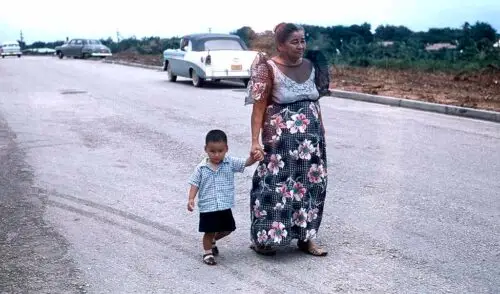Poksai: Informal Adoption
Table of Contents
Share This
To rear a child

Grandmother and Child, 1958. Guam Museum collection.
Poksai is a CHamoru verb meaning “to nurture.” It refers to the common Pacific Islander practice of informal adoption among extended family members.
The custom of poksai, existing since ancient times, addresses many familial issues. In ancient times all rights and privileges for adopted children were the same as biological children except and adopted child could not become maga’låhi (male leader of a clan). This custom guarantees children families and fulfilled parental yearning or pragmatic desires, while not denying rights or privileges available from a child’s natural parents. Children are raised by other members of their extended family if a parent dies or is unable or unwilling to provide for them. In the past, a child might also have been sent to be raised by another relative if the mother was unwed. Potential resources and opportunities for the child were increased through the customary practice of poksai.
Mapoksai, adopted children, were meant to be nurtured, guided and included in all the rights, responsibilities and obligations of natural children. In reality, family differentiates children by birth and by poksai — one does not necessarily inherit a position or title and mapoksai children may be referred to separately from other kin.
Today, some will legally adopt a child in order to qualify them for certain benefits such as health insurance. Many feel that the current US legal system has reduced the occurrence of poksai and question whether this legal system is best serving CHamoru families.
For further reading
Chamorro Heritage, A Sense of Place: Guidelines, Procedures and Recommendations For Authenticating Chamorro Heritage. The Hale’-ta Series. Hagåtña: Department of Chamorro Affairs, Research, Publication and Training Division, 2003.
Cunningham, Lawrence J. Ancient Chamorro Society. Honolulu: Bess Press, 1992.
Kasperbauer, Carmen A. “The Chamorro Culture.” In Kinalamten Pulitikåt: Siñenten I Chamorro (Issues in Guam’s Political Development: The Chamorro Perspective). The Hale’-ta Series. Hagåtña: Political Status Education Coordinating Commission, 1996.
